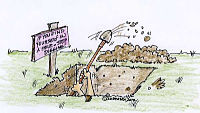Hope springs eternal in the human breast;
Man never is, but always to be blessed:
The soul, uneasy and confined from home,
Rests and expatiates in a life to come.
– Alexander Pope, An Essay on Man
What do you hope for in 2014?
Empirical studies indicate that most episodes of hope involve achievement-related goals, e.g. success in some academic, artistic, athletic, career, relationship, and so on. “Hope is the passion for the possible.”
When it is allied with our highest aspirations and deepest values, it can give us a general orientation to life that motivates us to take actions…and propel us towards our desires.
Hope is grounded in desire
In the quote above, Pope refers to the desire to be blessed. Do you know someone with the first name, Hope? Ask them why their parents gave them that name.
One friend told me she was born prematurely at 1.5 lbs in a place and time where there were no medical facilities to treat her. Her mother and father put her in an incubator—where she stayed for 4 months—and prayed, then hoped for the best. They were elderly parents and Hope turned out to be their only child—a true blessing in their lives! She felt truly loved by her parents, deeply cared for, and relishes the time she had with them. She feels blessed as their child.
Caring about our future
Hope belongs to a constellation of feelings and attitudes related to caring about our future. On the positive side it is related to optimism, confidence, courage, faith, gratitude, and contrasts with fear, pessimism, resignation, despair. Usually, it is felt less intensely than fear, more like a sentiment that has a positive moral value.
One function of hope is to give goals far away from us their due importance. For example, making a career change usually takes time. Hope rouses feelings necessary to influence our conduct, to motivate us to take actions towards future goals. It helps us to overcome everyday difficulties by looking beyond them to a better future.
Hope motivates us to plan
Having made several career transitions myself, and helped hundreds of individuals make significant career changes during the past 20 years, I have learned that hope—as a general orientation towards achieving future goals—increases the effectiveness of career change tools and techniques, such as visioning, goal setting, planning, implementing, adapting actions, prospecting opportunities.
In the quote above, Pope uses the word expatiates, which means to speak or write at length or in detail. I guide my clients through a process of speaking and writing to uncover their hopes and desires.
I strive to help my clients develop clarity about their strengths, particularly their talents and motivations, in order to foster realistic hope. Clarity feeds confidence and increases self-understanding, both necessary for taking effective actions to realize goals. But hope provides the framework for action.
Hope is the well spring of desire and we deserve to be in a state of desire!
After all, if we have no hope for a better future, why take any actions?
I will leave you with some words of hope from the wise…may they nurture and sustain and help you persevere through the difficult times of the year ahead.
Most of the important things in the world have been accomplished by people who have kept on trying when there seemed to be no hope at all. (Dale Carnegie)
Hope is the companion of power, and mother of success; for who so hopes strongly has within him the gift of miracles. (Samuel Smiles)
Consult not your fears but your hopes and your dreams. Think not about your frustrations, but about your unfulfilled potential. Concern yourself not with what you tried and failed in, but with what it is still possible for you to do.” (Pope John XXIII)












